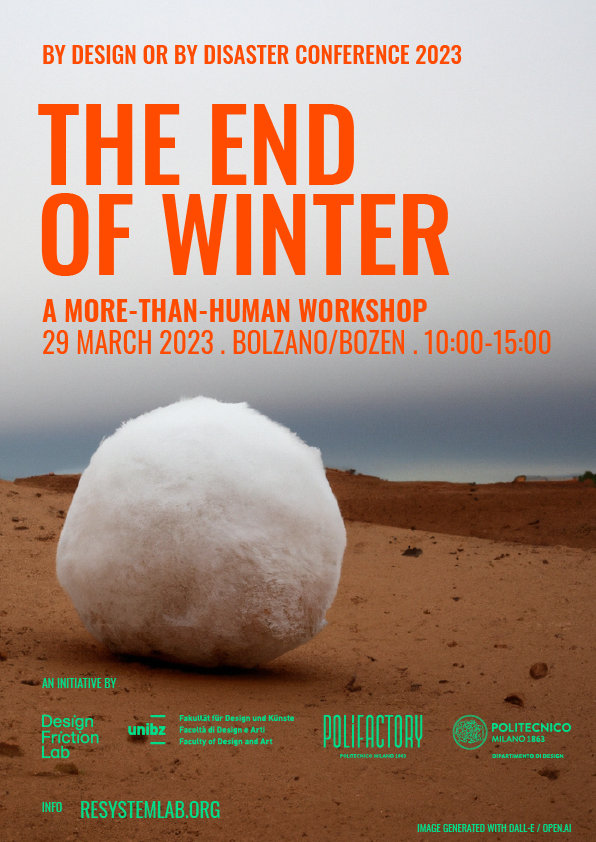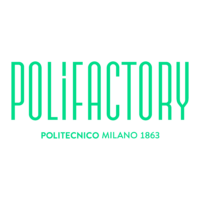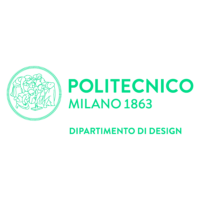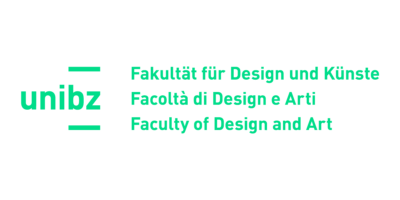In the face of the intertwined environmental, social, and economic challenges that we currently face, it has become increasingly clear that piecemeal solutions will not suffice. To effectively tackle the multifaceted crises that threaten our planet and our communities, it is essential that we approach design and decision-making from a systemic level. This means taking into account the complex and interdependent issues of climate change, biodiversity loss, inclusivity, and social justice, and finding holistic solutions that address all of these factors simultaneously. Only by embracing this comprehensive approach can we hope to create a sustainable future that meets the needs of all people and protects the natural world upon which we all depend.
In response to the urgent need to address the complex and pressing issues of climate change, biodiversity loss, inclusivity, and social justice, the makerspace Polifactory from the Department of Design at Politecnico di Milano and the Design Friction Lab from the Faculty of Design and Art at Free University of Bozen/Bolzano have come together with their respective innovation ecosystems to establish the ReSystem Lab.
This collaborative platform is dedicated to designing and implementing systemic solutions that address the root causes of these interconnected challenges. By leveraging the expertise and resources of both organizations, the ReSystem Lab aims to foster a culture of innovation and experimentation, while also promoting collaboration and knowledge-sharing across disciplines and sectors. Together, the partners in the ReSystem Lab are committed to creating a sustainable future that benefits both people and the planet.
At the ReSystem Lab, we are committed to fostering a culture of collaboration and innovation that is focused on designing connected and resilient systems of care. Our research platform is dedicated to exploring how we can develop holistic and integrated solutions that address the complex challenges facing a range of systems, including those related to food, health, and hospitality. By taking a systemic approach, we aim to design solutions that are not only effective but also sustainable and resilient in the face of changing circumstances and future uncertainties.
Our focus on systems of care reflects our belief that the challenges we face are interconnected and require a coordinated approach that takes into account the interdependencies between different systems. For example, the food system is intimately linked to issues of health, biodiversity, and social justice. Likewise, the hospitality industry is closely tied to concerns around sustainability, inclusivity, and cultural heritage. By designing solutions that address these interconnections, we can create systems that are more connected, equitable, and resilient.
Re-System Lab believes that collaboration is key to achieving our goals. We work closely with a range of stakeholders, including academic institutions, industry partners, and community groups, to co-create solutions that are tailored to the needs of different contexts and communities. Through our research, we aim to contribute to a growing body of knowledge on systemic design and help shape a more sustainable and equitable future for all.
WHO WE ARE
Prof. Stefano Maffei
Polifactory, Department of Design, Politecnico di Milano
Architect and Ph.D. in Design. Rector’s Delegate for Social Innovation, Full Professor at the School of Design, Politecnico di Milano. He teaches Advanced Product-Service Systems and Production Models, Service Design, and Innovation Theories and Cultures. Director of Polifactory, Director of the Design Policy Lab, and Director of the Service Design and Design for Food Specializing Masters,POLI.design. His current research perspective is based on a more-than-human and socially and environmentally inclusive approach and deals with micro-macro systemic approaches for new production-distribution models, advanced-distributed-micro manufacturing systems, and service design-driven innovation.
Prof. Massimo Bianchini
Polifactory, Department of Design, Politecnico di Milano
Ph.D. in Design, Associate Professor at Design Department – Politecnico di Milano. He teaches Integrated Product Design and Open and Distributed Design at the School of Design. Since 2015, Lab Manager of Polifactory. His research interests focus on design for distributed production, self-production, urban manufacturing, indie innovation, low and craft-tech innovation, and, more recently, post-humanism. He participated in several research and innovation projects – at the national and European levels (Horizon 2020; Horizon Europe, Creative Europe) – working on open and distributed innovation, user-driven and patient innovation, and circular innovation.
Prof. Nitzan Cohen
Design Friction Lab, Faculty of Design and Art, unibz
Designer, professor for product design, and the Dean of the Faculty of Design and Art, at the Free University of Bolzano (unibz); where he founded the ‘Design Friction Lab’ an interdisciplinary Research and Design Lab looking for innovative sustainable solutions for an industrial and societal transformation. Under his direction, the Lab is currently active in the fields of growing materials, the future of open-source production, and sustainable Nano-electronics. Cohen won several international design awards, and his designs and art-direction works are part of the most renowned design collections worldwide.
Prof. Seçil Ugur Yavuz
Design Friction Lab, Faculty of Design and Art, unibz
Ph.D. in Design at Politecnico of Milano, associate professor at Free University of Bozen-Bolzano, Faculty of Design and Art. Through participatory design and co-design methods, her research situates in contexts such as Fablabs, makerspaces and schools, engaging with children, makers, and crafters. Her research aims at opening debate and stimulating new visions of interaction within the entanglement of our socio and technological spheres towards sustainable and desirable future(s).
Dr. Camilo Ayala Garcia
Design Friction Lab, Faculty of Design and Art, unibz
Camilo obtained his Ph.D. degree on the topic of Do-It-Yourself Materials as triggers of change at Politecnico di Milano. Prior to this Ph.D. research, Camilo received his Bachelor degree in Industrial Design from the Los Andes University in Bogotá in the year 2004. He also obtained his Bachelor Degree in Textile Design from the same university simultaneously. In the year 2007, received his Master of Arts in Design degree from Domus Academy (the University of Wales accredited school of design) in Milan awarded with Distinction. Camilo is currently entitled Assistant Professor and Researcher at the Free University of Bozen-Bolzano. Together with his teaching activities, Camilo devotes his research to local materials and product development, with several patents granted as well as different academic contributions published.
ACTIVITIES

The End of Winter | Workshop
29th March 2023
By Design or by Disaster Conference 2023
Free University of Bozen-Bolzano
Are we really facing the End of Winter?
In this workshop, we will be exploring the potential future impacts of climate change on the winter season in the Trentino Alto-Adige/Sudtyrol region, imagining both utopian and dystopian scenarios that could emerge from this transition. As the impacts of climate change continue to intensify, the winter season in the Trentino Alto-Adige/Sudtyrol region is becoming increasingly uncertain. While this could pose significant challenges to many systems, including energy production, agriculture, and tourism, it could also present opportunities for innovative solutions that help to mitigate the impacts of climate change.
Over the past decade, there has been a growing recognition of the urgent need to address the socio-environmental and technical challenges posed by the new Climatic Regime described by Bruno Latour. The increasing impact of global warming has highlighted the need for proactive action to address the irreversible changes that are already underway and anticipate the potential massive changes that could result. As noted by IPCC’s latest report, the impacts of climate change are accelerating and no single action will be sufficient to avoid the most severe impacts. Therefore, a participatory multiscale perspective is essential to address the issue in a comprehensive way, considering the social and environmental impacts of climate change across different scales and involving diverse stakeholders in the decision-making process.
To tackle this challenge, we propose an approach that begins by recognizing the complexity and urgency of the issue at hand, acknowledging the irreversible changes that are already underway. From there, we can engage in a participatory multiscale perspective to explore the potential impacts and generate ideas for innovative solutions. Our approach involves bringing together experts from various disciplines, such as food scientists, designers, and farmers, to collaboratively map the complex web of problems and systems affected by climate change. By engaging with artificial intelligence and using the methods and projections of Design Fiction, we can envision possible future scenarios and generate ideas for new product-service systems that could help mitigate the impacts of climate change.
Our approach is grounded in the recognition that the challenges posed by climate change require a multidisciplinary and participatory approach that engages diverse stakeholders in the decision-making process. Participatory approaches have been found to be effective in addressing complex socio-environmental challenges and promoting sustainable development. Furthermore, a multiscale perspective is essential to understanding the interconnected nature of social and environmental systems and identifying the potential impacts of climate change across different scales (O’Brien et al., 2009). By adopting a participatory multiscale perspective, we can develop innovative and comprehensive solutions that address the challenges posed by the contemporary Climatic Regime.
Moreover it involves recognizing the urgency and complexity of the challenge posed by climate change, engaging in a participatory multiscale perspective, and using Design Fiction and artificial intelligence to generate innovative solutions. By working collaboratively across disciplines and engaging diverse stakeholders in the decision-making process, we can develop solutions that are effective, sustainable, and equitable, helping to create a more resilient future for all.
References:.
O’Brien, K., Sygna, L., & Haugen, J. E. (2009). Vulnerable or resilient? A multi-scale assessment of climate impacts and vulnerability in Norway. Climatic Change, 102(1-2), 293-302.
Workshop Program
10.00 – 10.30 Welcome and introduction
Presentation of the ReSystem Lab + launch of “The End of Winter” workshop
Nitzan Cohen, Design Friction Lab, Faculty of Design and Arts, unibz
Stefano Maffei, Polifactory, Department of Design, Politecnico di Milano
10.30 – 12.00 Workgroup session
Sharing ideas and experiences on the “End of Winter” from a multidisciplinary perspective and diverse practices.
Invited stakeholders:
Elizabeth Tauber – Faculty of Education, unibz
Giacomo Bertoldi – Institute for Alpine Environment, EURAC Research
Michele Bozzoli – Institute for Alpine Environment, EURAC Research
Noa Paul – Sappa, Plant based Design
Kathrin Kofler – BITZ Fablab
Alumni Design, unibz
and PhD candidates from the Faculty of Engineering, unibz
12.00 – 13.00 Break (lunch)
13.00 – 15.30 Workshop
Generating ideas looking inside and beyond the “End of Winter”
Participants: master’s degree and PhD students from unibz
Contact
@ polifactory@polimi.it
@ design-art@unibz.it






